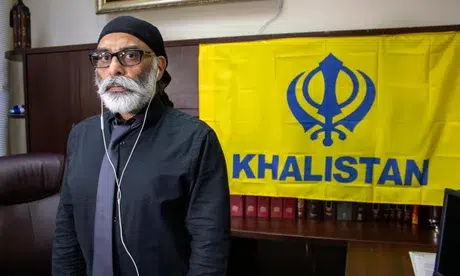The United States has charged a former Indian intelligence officer in connection with a failed plot to assassinate a prominent Sikh separatist leader in New York last year, intensifying diplomatic tensions between Washington and New Delhi.
The indictment against former officer of India’s Research and Analysis Wing (RAW) Vikash Yadav was unsealed on Thursday, revealing his alleged role in the murder-for-hire scheme targeting Sikh leader Gurpatwant Singh Pannun.
US pushes India on alleged plot
Yadav, who remains at large, is accused of directing a foiled plan to murder Pannun, a U.S. citizen and vocal advocate for Sikh independence, as part of a broader campaign against separatists.
The initial disclosure of the plot came last year when federal prosecutors charged Nikhil Gupta, a man allegedly hired by Yadav to carry out the assassination. Gupta was reportedly recruited by an unidentified Indian government employee at the time, but Yadav’s role has now been publicly revealed.
Pannun, a lawyer and leader of the Khalistan movement—which seeks an independent Sikh state to be carved out of India—has been a target of international tensions, particularly as India considers the movement a security threat. His assassination was reportedly planned by Indian operatives in retaliation for his activism.
Read More:UAE introduces four mandatory medical tests for Pakistanis
“The FBI will not tolerate acts of violence or other efforts to retaliate against those residing in the U.S. for exercising their constitutionally protected rights,” FBI Director Christopher Wray said in a statement.
India-US diplomatic fallout
The unsealing of Yadav’s indictment comes at a sensitive time for US-India relations, which have been strained by similar accusations involving Sikh separatists. Days earlier, Canada expelled six Indian diplomats after alleging Indian authorities were involved in the 2023 murder of Hardeep Singh Nijjar, another prominent Sikh separatist, on Canadian soil. In response, India expelled Canadian diplomats and denied the accusations.
The diplomatic row between India and Canada has sparked protests among the global Sikh diaspora, with many accusing India of targeting activists advocating for Khalistan. The movement, which India deems a terrorist threat, led to a deadly insurgency in the 1980s and 1990s, killing tens of thousands.
As Washington seeks to maintain strategic ties with New Delhi, particularly in countering China’s influence in the region, it has also pressed India to cooperate in investigating the plot against Pannun. US and Indian officials met in Washington on Tuesday to discuss the case, in what the US State Department described as a “productive” meeting.
Canada’s Prime Minister Justin Trudeau further escalated tensions by accusing India of orchestrating violent campaigns against Sikh activists abroad. “This includes drive-by shootings, home invasions, violent extortion, and even murder in and across Canada,” Trudeau said, calling the actions a violation of Canadian sovereignty.
India has consistently denied such allegations, labeling Sikh separatists as terrorists and threats to its national security. The growing scrutiny of India’s actions, however, may test its diplomatic relationships with key Western nations at a time when the country is being viewed as a crucial geopolitical ally in the region.















